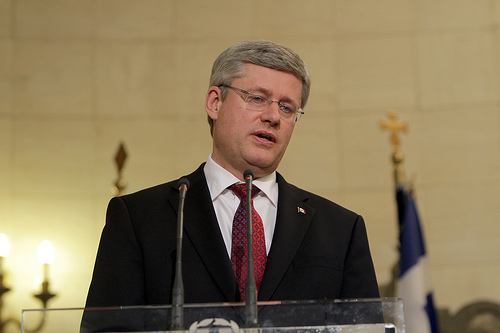You can change the political conversation. Chip in to rabble’s donation drive today!
There was considerable fanfare and red carpet during Prime Minister Stephen Harper’s trip to Israel this week.
After nearly eight years in office, the prime minister visited the country with which he has forged closer links than almost any other. The spectacle was breathtaking, with a delegation of over 200 people, including six cabinet ministers and other government MPs. With that sort of political heft, the opportunity to press important issues was considerable.
How disappointing, though not surprising, that Israel’s numerous human rights shortcomings did not make that list.
Over eight years, the prime minister and his five foreign ministers have shown no appetite to press the Israeli government to improve its human rights record. In fact, in his speech to the Knesset he equated criticizing Israel with anti-Semitism; and declared critics only chastise Israel “to get along.”
There was no criticism of civilian casualties during armed conflict in Gaza in 2008-09 and 2012; nor has Canada raised concerns about the punishing Gaza blockade. And it would be generous to say that Canada has expressed mild concern about illegal Israeli settlements.
These days, Canada’s voting record at the UN says it all. When critique of Israel is on the table, Canada’s vote is “no.” Not that UN politicking about Israel’s human rights record is without problems. It is polarizing and, very often, one-sided. But Canada waded through that more delicately in the past. Never so blatantly partisan.
And it is not to dismiss the very real insecurity Israel has faced for decades. Clearly the Israeli government must respond to those threats; but must do so in keeping with international law.
Many eyes were watching closely during this visit, within Israel, in Gaza and the West Bank, in the region, around the world and — of course — back in Canada. There would have been no better time to show that Canada is a principled human rights champion, prepared to urge a close ally to do better. But that was not to be; not for lack of concerns to highlight.
Beginning with dealing with the past. Gaza is a stark reminder. Enmity drags on. Violence is entrenched. Human rights violations repeat. All fueled by longstanding impunity that denies justice equally to victims of Israeli missiles and Palestinian rockets. Israel refused to co-operate with a UN investigation into the military operation in Gaza in 2008-09 and has not thoroughly investigated alleged violations during the November 2012 Gaza campaign.
Impunity for mass violations extends to individual cases. Israeli armed forces repeatedly use excessive force against Palestinian demonstrators in the West Bank. There have been dozens of deaths and hundreds of injuries over the past decade, often during protests against settlement expansion or the infamous wall. In these tragic cases, too, there is rarely any accountability. Canada has championed strengthened justice for human rights violations worldwide and has the authority to press Israel on this. But that was not to be.
The prime minister declined to raise even mild concerns about Israeli settlement policy during the visit. A starting point to a more credible position would have been to call, while in the country, for an end to forced evictions and the demolition of Palestinian homes in the West Bank, which facilitate expanding settlements. Not to be.
The visit also offered an opening to press for the agonizing Gaza blockade to be lifted. Gazans have lacked safe drinking water, can face 12-hour power outages daily and struggle to access adequate food and medicine. Attiyeh Abu Khousa, whose 13-year-old son was killed by a missile fired by an Israeli drone, told Amnesty International that “the blockade is as bad as the war; it’s like a slow death for everyone in Gaza.” That was not to be.
There was much more on the human rights front that the prime minister should have raised. Legislate an absolute ban on torture and investigate all allegations of torture. Release prisoners and repeal imprisonment on grounds of conscientious objection to military service. End administrative detention, under which over 130 prisoners are held without charge. Revoke orders which make peaceful protests by Palestinians illegal unless authorized by an Israeli commander. Pull back from proposed legislation that would lead to forced evictions of 30,000 Bedouin in the Naqab/Negev desert.
And repeal recent amendments to the ominously titled Prevention of Infiltration Law, allowing indefinite detention of refugees and asylum-seekers, many fleeing atrocities in countries like Eritrea and Sudan, in a remote desert prison. Prime Minister Harper might have reminded Israel of the leading role it once took in drafting the UN Refugee Convention. But none of that was to be.
More than anything, this would have been a tremendous opportunity for the prime minister to hear directly from the individuals and communities whose rights are on the line, be they Palestinians in the occupied territories, inhabitants of unrecognized Bedouin villages or refugees in a desert prison.
This trip was a long time coming. The need for a clear indication that Canada wants a friend to improve its human rights record has also been a long time coming. But that was not to be.
Alex Neve is secretary general, Amnesty International Canada; Béatrice Vaugrante is executive director, Amnesty International Canada Francophone; Yonatan Gher is executive director, Amnesty International Israel.
This article originally appeared in Embassy News and is reprinted with permission.
Photo: flickr/Πρωθυπουργός της Ελλάδας




